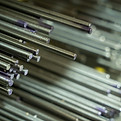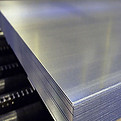Nickel Alloy 400 (2.4360)
Engineered for toughness, trusted for corrosion resistance in marine, chemical, and high-stress industrial environments.
Nickel Alloy 400
Nickel Alloy 400 (UNS N04400 / 2.4360) is a solid-solution nickel-copper alloy designed for exceptional performance in highly corrosive and mechanically demanding conditions. With a typical composition of 66% nickel and 30% copper, it delivers outstanding resistance to seawater, hydrofluoric acid, alkaline salts, and a wide variety of reducing media, making it ideal for harsh marine and chemical process environments.
Alloy 400 resists chloride-induced stress corrosion cracking, enabling long-term reliability in high-salinity systems. Its consistent mechanical strength, excellent thermal conductivity, and low corrosion rate in fast-moving brine environments make it a go-to material for subsea equipment, desalination plants, and heat exchange systems.
Known for its ease of fabrication, welding, and machining, Alloy 400 supports efficient manufacturing and integration into pressure-rated systems, from pump shafts and condensers to offshore risers and boiler feedwater heaters.
CUT TO LENGTH
Tell us the lengths you need and we will cut to length!
FORM
Special shapes that require forming or pressing? Yep - we do that too!
BEND
From a satin finish, all the way up to super mirror. Let's make it sparkle!
POLISH
Need a specific bend or radius? No problem!
AVAILABLE FORMS
Intamet offers Nickel Alloy 400 in a range of forms, including:

Tubes & Pipes

Fittings & Flanges

Round Bars

Sheets & Plates
FAQs: Nickel Alloy 400
Need assistance or more information?
Get in touch with us today!
Have questions or need more details about this product?
Our team is here to provide expert guidance and ensure you have all the information you need to make the right choice for your project, contact us today with an enquiry!
